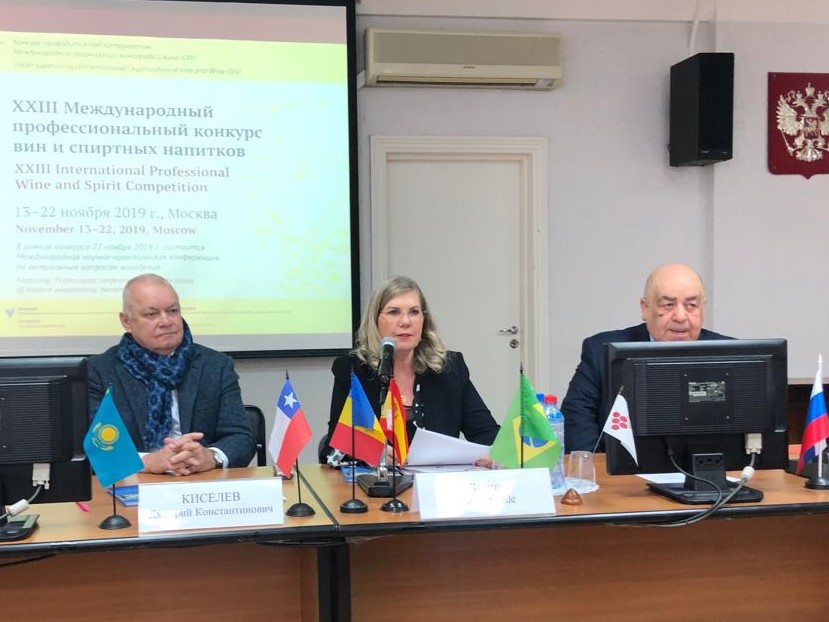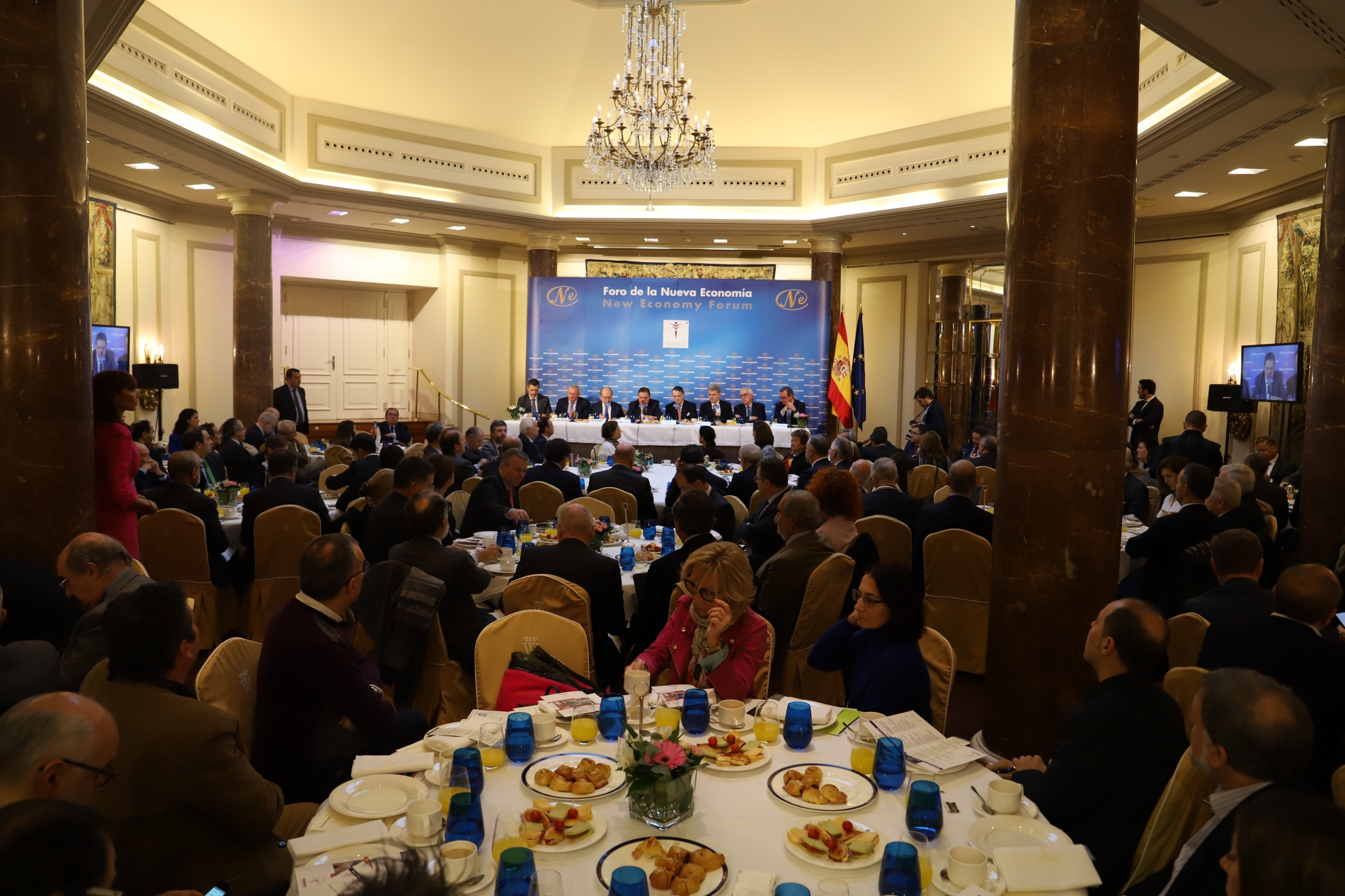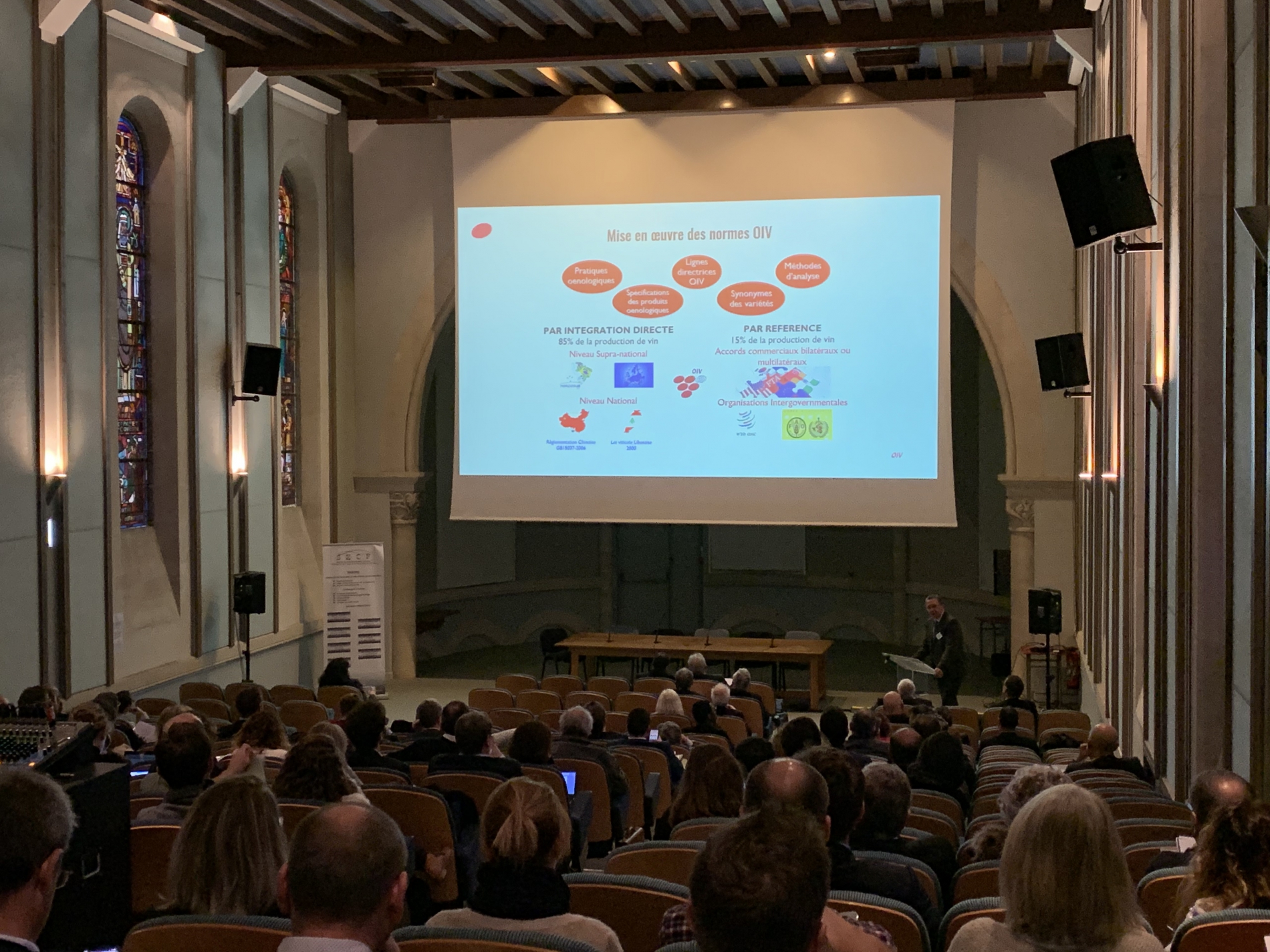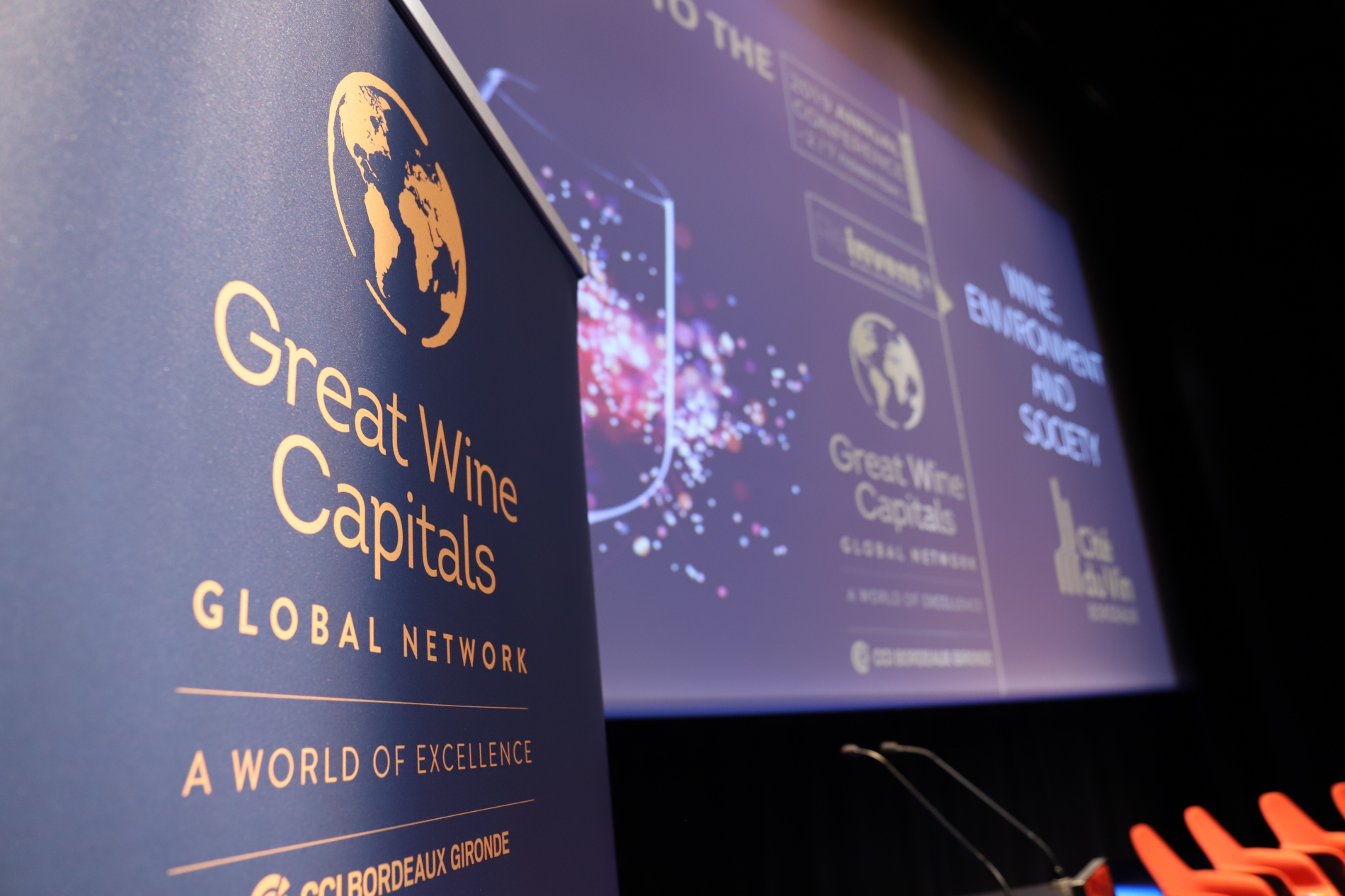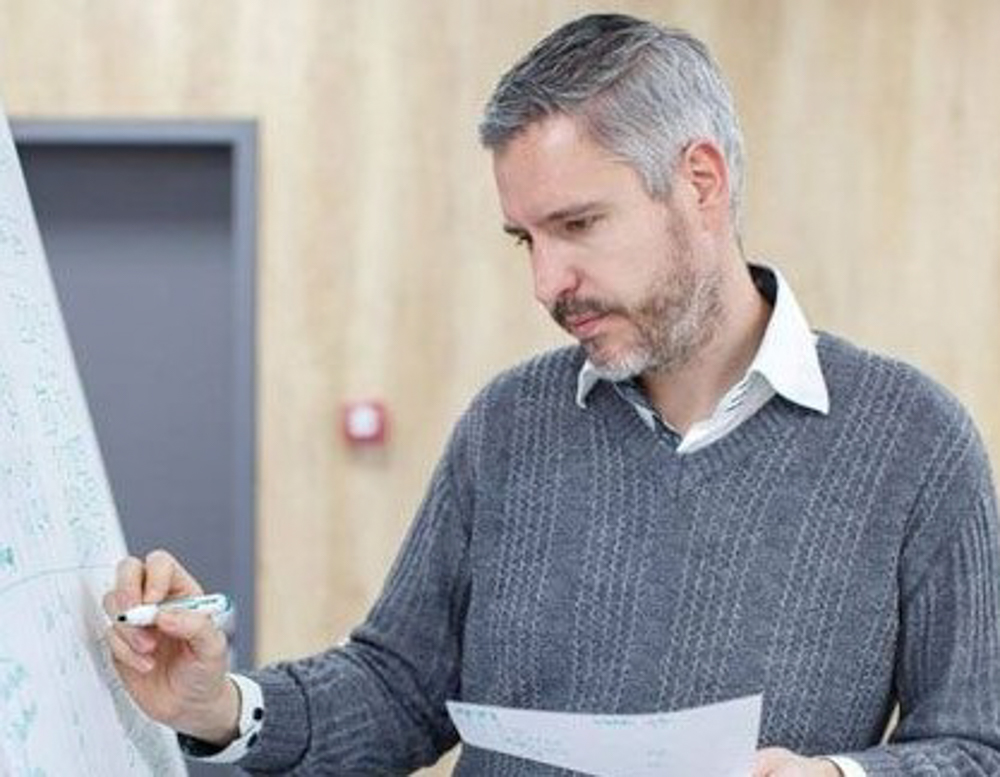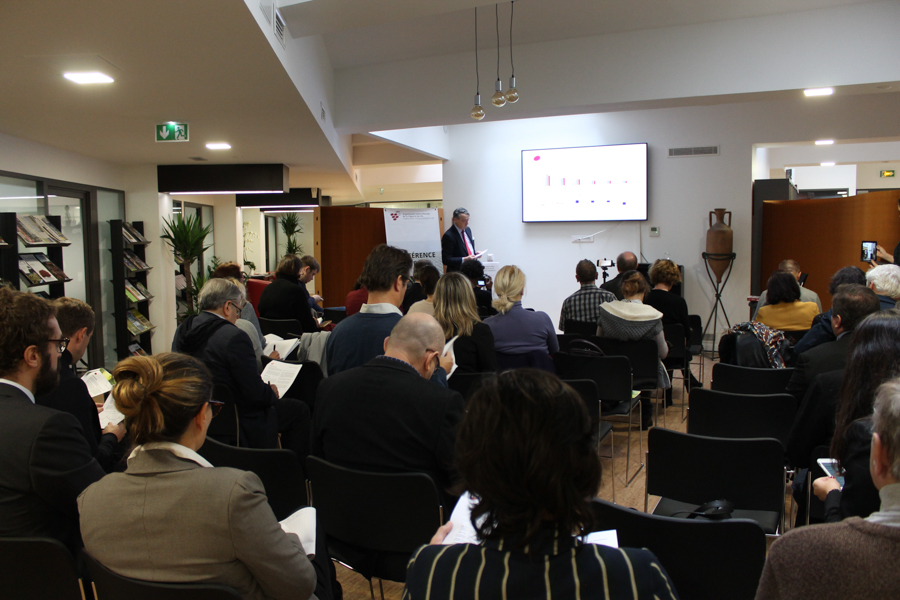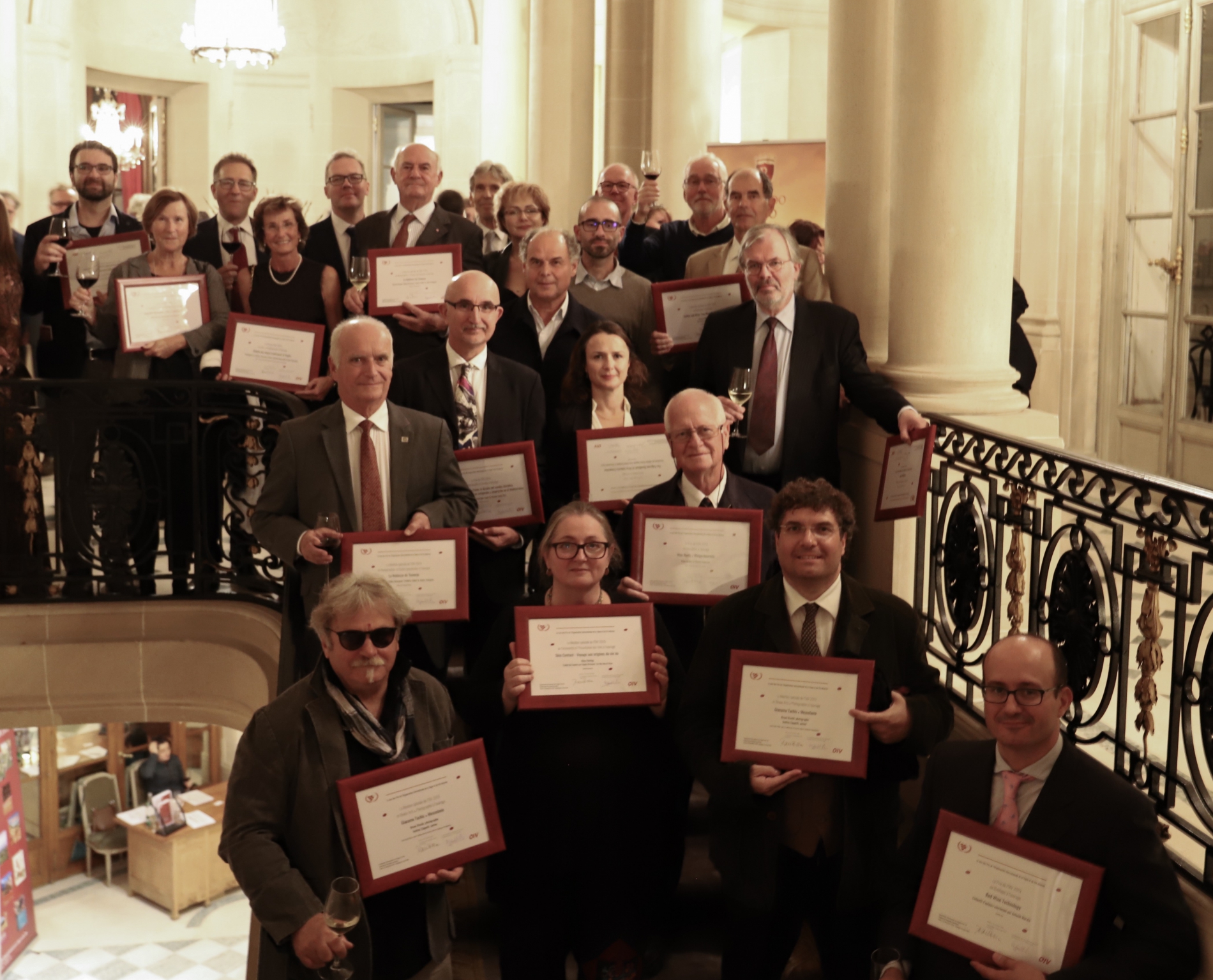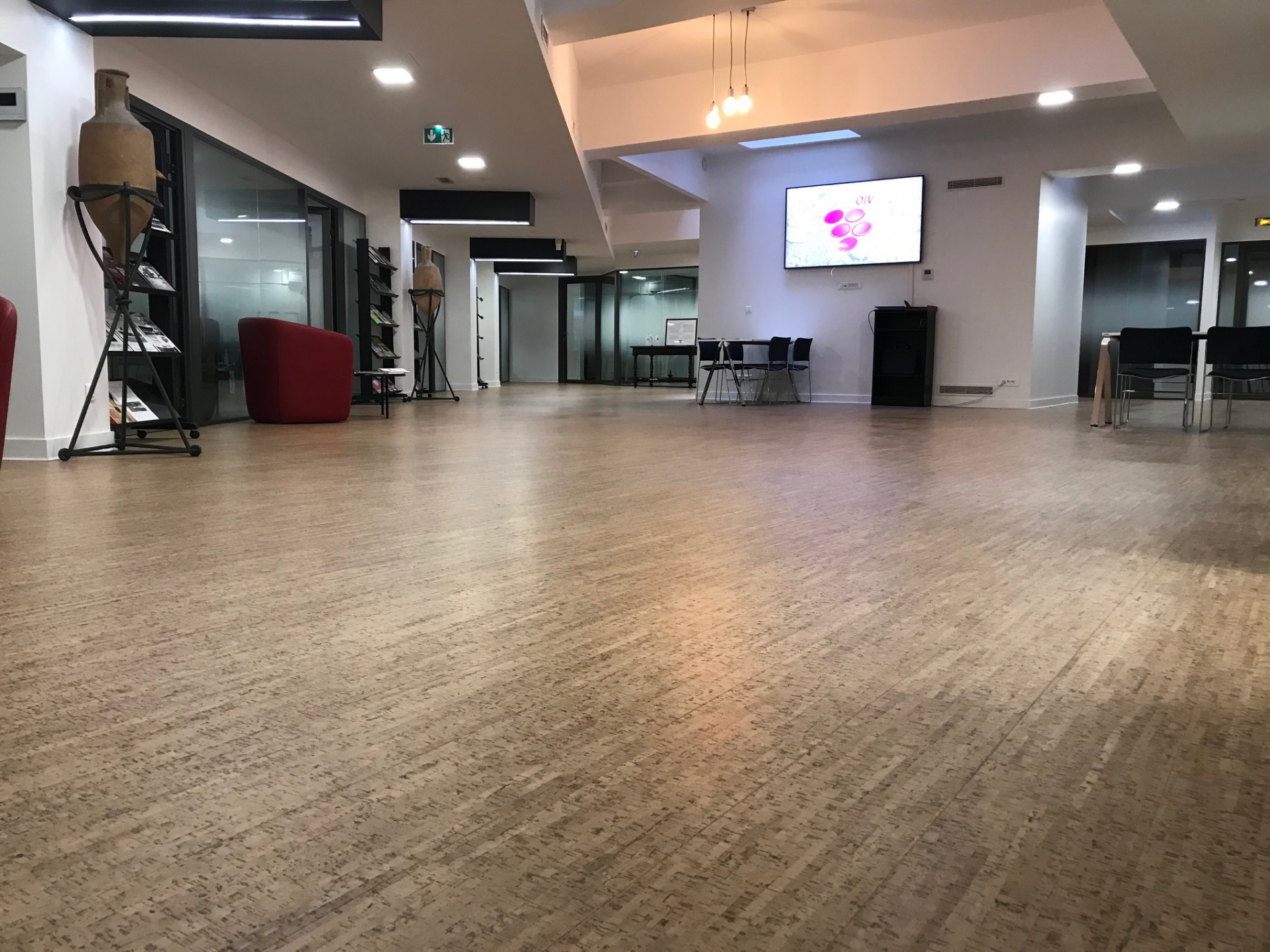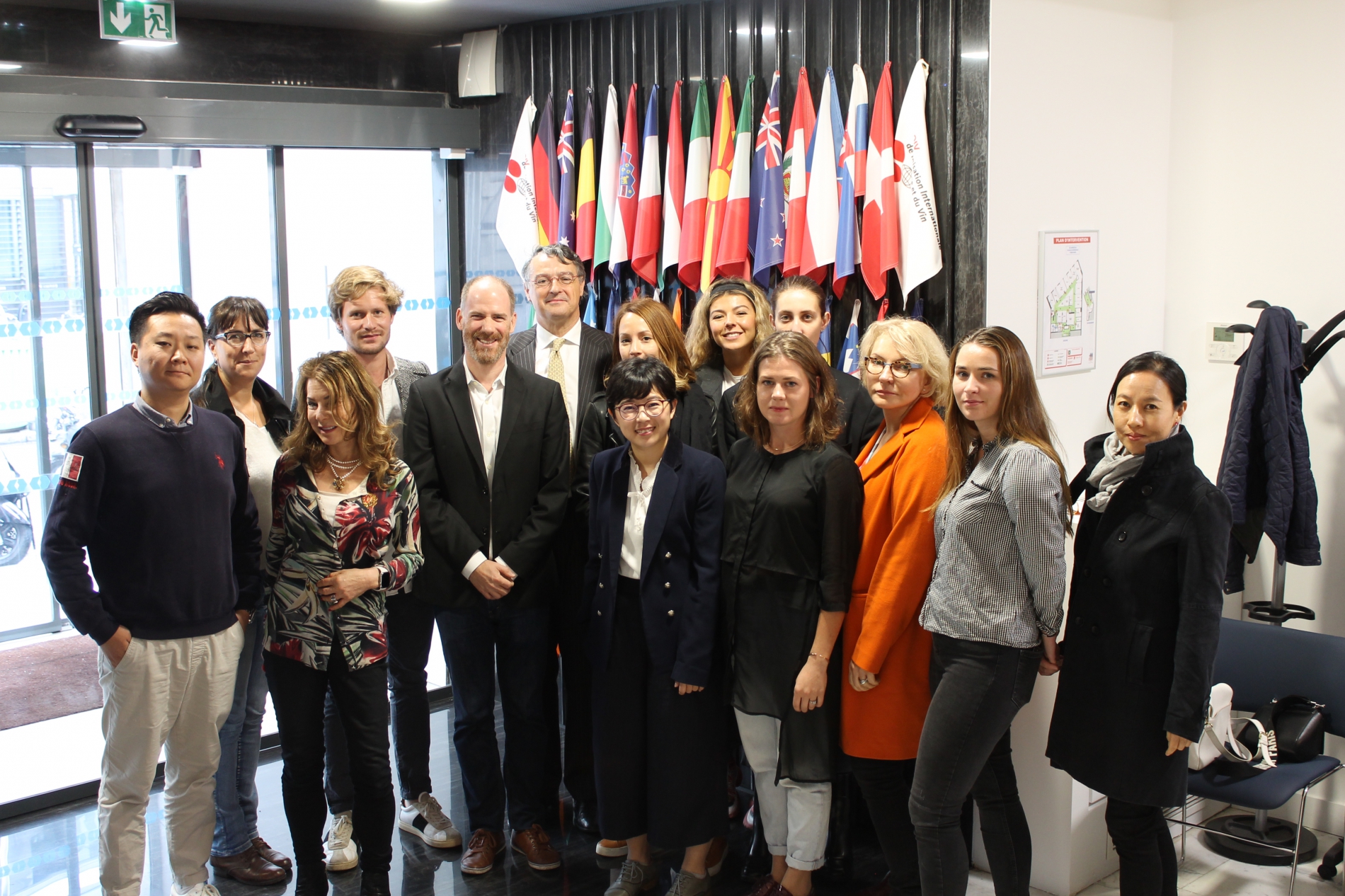04 Dec 2019
At a conference held during the event, the OIV President presented an overview of the vitivinicultural sector. She also participated in the award ceremony of this competition that has enjoyed OIV patronage for a number of years.With Dmitry Kiselev (left) and Lev Oganesyants (right) during the conferenceOn this occasion, Regina Vanderlinde had the opportunity to meet with representatives from the Russian authorities. She had discussions with Sergey Levin, the Russian Federation’s Deputy Minister for Agriculture. During their meeting, Sergey Levin confirmed that Russia will complete the necessary steps to formalise its request to introduce Russian as an official language of the OIV. If confirmed, Russian would become the OIV’s sixth official language, along with French, English, Spanish, German and Italian.Regina Vanderlinde with Deputy Minister Sergey Levin at the Russian Ministry for AgricultureRegina Vanderlinde was also invited to visit the Russian Research Institute for Wine, Beer and Soft Drink Industries by Director Lev Oganesyants and Deputy Director Alexandre Panasyuk. With Alexandre Panasyuk (left) and Lev Oganesyants (right)In addition, the OIV President met the new President of the Russian Union of Oenologists and Winemakers, Dmitry Kiselev, who is also Director General of Russia’s state-owned international news agency Rossiya Segodnya.Regina Vanderlinde welcomes the important discussions that took place at these meetings, during which the Russian authorities expressed a strong desire to invest in the development of the country’s vitivinicultural sector, as well as to significantly increase of Russia’s participation in the work of the OIV.
24 Nov 2019
On this occasion, Pau Roca explained how the OIV, since its creation, has been fundamental in the regulation of the sector: “the harmonisation of definitions, oenological practices, methods of analysis, labelling, etc. has levelled the playing field for more or less everyone. Even countries that are not members of the OIV follow its standards, or members refer to these in the context of certain trade agreements”.Even though, in his opinion, this sector is far more regulated than others, “this does not impede the development of world trade, since wine is a highly internationalised product. Nearly one in every two bottles crosses a border”.In this context, Pau Roca believes that: “the degree of standardisation is the product of historical maturity and evolution”. The OIV, “contrary to other bodies whose standards are mainly limited to food safety, deals with questions of integrity, identity, origin, etc., which are very important in the wine sector. In reality, we have been precursors to many quality standards in the wine sector”, he declared.In this sense, the Director General considers that these regulatory conditions give the sector a distinct economic structure, whose most striking characteristic or symptom is the fragmentation and vast diversity of actors.Although this is a hindrance to the existence of global brands, “because brands must compete for visibility with the origin”, he highlighted, “in a system of small dimensions, big investments and low immediate returns, this is not always a disadvantage”. The Director General of the OIV justified this in that “this economic structure will be a model of resilience, which, by innovating and adapting, is resisting against the inexorable climate crisis resulting from global warming”.To address climate change, Pau Roca believes that “economists should study ecology more, to understand how some of the laws or basic principles work in a terrestrial or marine ecosystem.”Sustainability as a new value for growthThe OIV Director General asserts that “an economy that pays attention to this reality is definitely on the right track. Growth will be an indicator of transition, yet the goal should be to preserve the biosphere; the objective of humanity is to preserve this finite asset that is the earth, and that, as such, is the only capital of reference”.In fact, in his speech he placed emphasis on the new OIV Strategic Plan for the next five years (2020-2024).This Strategic Plan has six major axes from which objectives to be pursued are derived, “and we have carried out an exercise to align these with the United Nations Sustainable Development Goals [SDG]. If we succeed in fulfilling our Strategic Plan, we will be able to say that, in the wine sector, we are more or less on target, for 13 out of the 17 SDG”, Pau Roca reported.Three axes are on sustainability and adaptation to climate change, without forgetting mitigation efforts, because, as Pau Roca sees it, “we have to provide an answer to the millions of producers that don't wish to relocate their production – which we as consumers don’t want, either. Three concepts form the basis of the terroir: the climate factor, which as we can see is uncontrollably changeable at the moment; the soil, which is also affected by the climate; and the plant material and great genetic diversity provided by the Vitis genus and the work of people and tradition”.Note: The new OIV Strategic Plan will be available online in the next few weeks.
19 Nov 2019
On 15 November 2019, over 200 participants attended the 7th Wine Track® event, held in Reims (France).Under the high patronage of the OIV, this symposium co-organised by the Society of Chemical Experts of France (SECF) and the Champagne-Ardennes section of the Union of Oenologists of France was a unique opportunity for scientists to discuss the tools and techniques that help ensure the traceability and guarantee the authenticity of vinicultural products, especially in relation to counterfeiting and fraud.OIV Scientific Coordinator Jean-Claude Ruf took the opportunity to highlight the OIV’s long-standing commitment in these areas, particularly through the creation of international standards relating to:
- the definition of products,
- oenological practices, in particular as regards consumer safety and maintaining the authentic character and organoleptic qualities of wines,
- labelling rules,
- the implementation of traceability standards, and
- the implementation of analytical standards to monitor this traceability and origin.
12 Nov 2019
OIV Director General, Pau Roca, opened the conference "Wine, Environment & Society" on Tuesday 5th November2019 with an intervention focusing on "Global Environment Issues and Impact on Society". Suzanne Mustacich, contributing editor for Wine Spectator, was the master of ceremonies in this conference, in which the OIV expert and the Organisation's ENVIRO group (Sustainable development and climate change) president, Professor Hans Schultz, (also president of Hochschule Geisenheim University), has participated by speaking about the "Impact of warming climate on the wine production". The speaker's panel was completed by the Research Director of Bordeaux ISVV, INRA: Eric Giraud-Héraud, who spoke on "the impact of consumers requesting wineries to produce 'clean and green' wines". Suzanne Mustacich, Pau Roca, Hans Schultz, Eric Giraud-HéraudA discussion panel followed their interventions with the participation of Jeremy Cukierman MW, Director of KEDGE Wine & Spirit Academy; Caroline Feely, Director of Château Feely; Caroline Frey, owner & Oenologist in Château La Lagune; Kim Forsberg, Sustainability Manager Vingruppen (Sweden), in the picture below. New biological and organic modes of cultivation, such as more eco-friendly packaging and transports logistics, where part of the main points discussed.About the great Wine Capitals Global NetworkThe Great Wine Capitals is a network of ten major global cities in both the northern and southern hemispheres, which share a key economic and cultural asset: their internationally renowned wine regions.This network encompasses the so-called ‘Old’ and ‘New’ worlds of wine, and it aims to encourage travel, education and business exchanges between the prestigious wine regions of Adelaide, Bilbao, Bordeaux, Lausanne, Mainz, Mendoza, Porto, San Francisco, Valparaiso and Verona.Being founded in 1999, the Network has developed and introduced several projects, initiatives and programs with the objective of achieving excellence in tourism, business services and education within the global alliance of its renowned wine regions.
03 Nov 2019
After praising the work of Jean-Luc Berger, who carried out this role with the greatest of skill in recent years, the CST was unanimous about a career path that meets the requirements of an essential position for the review of scientific and technical works submitted to the OIV Awards.An engineer in oenology and viticulture (Changins School of Viticulture and Oenology in Switzerland), Richard Pfister was awarded the Swiss Union of Oenologists’ prize for his thesis on sensory analysis entitled ‘La méthodologie de l’olfaction en parfumerie : Possibilités d’application à l’analyse sensorielle des vins’ (The olfaction methodology in perfumery: possible applications for the sensory analysis of wine).After working as an oenologist in Spain and several years dedicated to the creation of perfumes, he became an international consulting oenologist and sensory consultant. He has also taught at a number of prestigious wine schools (Changins School of Viticulture and Oenology in Switzerland, the Institute of Vine and Wine Science (ISVV) at the University of Bordeaux in France, and the AgroSup Dijon School of Agronomic Engineering, also in France).We extend a warm welcome to Richard Pfister among the members of the OIV Award Jury!In addition, Richard Pfister is an international expert wine judge, an OIV and VINOFED observer, a book reviewer for works submitted to the OIV Awards, an international speaker and trainer, the author of oenological articles for a number of French, Swiss and Italian journals, and, since 2006 he has been editor of Objectif (a Swiss magazine dedicated to viticulture, oenology and arboriculture).He has been a Council member of the Fondation Internationale des Sciences et Culture de la Vigne et du Vin in Aigle, Switzerland, since 2013.His work, ‘Les parfums du vin’ (The perfumes of wine), a book on sensory analysis, received the OIV Award in 2015.We extend a warm welcome to Richard Pfister among the members of the OIV Award Jury!
30 Oct 2019
During the press conference held at the headquarters of the International Organisation of Vine and Wine, the Director General of the OIV, Pau Roca, presented the first estimations for world wine production in 2019.Press releasePPT Presentation 2019 Wine production first data estimations
14 Oct 2019
Hosted by H.E. Mr Juan Salazar Sparks, the 2019 OIV Awards ceremony was held in the suites of the Embassy of Chile in Paris. The event was attended by numerous representatives of the Diplomatic Corps, together with OIV President Ms Regina Vanderlinde, OIV Director General Mr Pau Roca, Award Jury President Ms Azélina Jaboulet-Vercherre, and Award Jury Scientific Secretary Mr Jean-Luc Berger.From left to right: Pau Roca, Julien de Beaumarchais de Rothschild (Vice-Chairman of the Board of Directors Baron Philippe de Rothschild), Regina Vanderlinde, H.E. Mr. Juan Salazar Sparks, Azélina Jaboulet Vercherre, Jean-Luc BergerThe renown and prestie of this mark of international recognition were confirmed once again this year by the high quality level demonstrated by the 2019 Award winners in each of the fields represented: scientific and technical, literary, historical, and artistic. A total of 11 Awards and 9 Special Mentions were given out by the international OIV Jury.Read full press release https://youtu.be/FxX-8NtDqvY
10 Oct 2019
The repurposing of the building in rue d’Aguesseau prompted the OIV to move its Secretariat, although it will still be located in the 8th arrondissement of Paris, near Parc Monceau.Home to the management and services functions of the OIV since mid-September, the functional and contemporary space has been renovated using cork, thanks to the support of Amorim.Just a stone’s throw from the Place de Rio de Janeiro, dear to the President of the OIV, the new OIV premises at 35 rue de Monceau will host experts attending autumn meetings to take place in the conference centre located opposite on 14 and 15 October, and then in Val de Loire for the adoption of the 2020-2024 Strategic Plan.
07 Oct 2019
To attend this press conference, journalists are kindly asked to send an email with their name and their professional contact details to press@oiv.int.Date: Thursday 31 October 2019Time: 11amLocation: *attention new headquarters* International Organisation of Vine and Wine, (OIV), 35 Rue de Monceau, Paris 75008 - Metro station Monceau or Miromesnil [see map]
30 Sep 2019
After a presentation of the OIV and its activities given by the various unit heads, this year’s MSc students were welcomed by the Director General, Pau Roca, who explained the future strategic plan of the Organisation and spoke about the main issues for the vitivinicultural sector of today.The specific nature of the course is designed to be mono-sectoral, multi-disciplinary, itinerant, international and experiential all at the same time; it also now has one of the most developed networks in the world of wine. Since 1988, almost 500 players and policy makers in the wine world have taken this training programme.The international dimension to this programme is expressed through a curriculum that every year leads students to discover over 20 key countries on the wine planet, spread over the 5 continents.This was an opportunity for the students on the 32nd year of the OIV MSc in Wine Management to explore the new premises of the OIV, which now resides at 35 Rue de Monceau, 75008 Paris.
